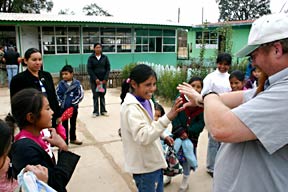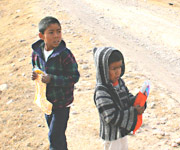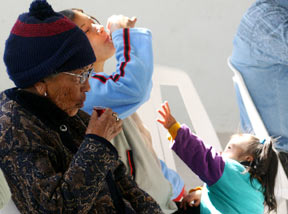Posted: 4/13/06
|
| More than 450 people gathered to celebrate the opening of the Piper Children’s Center on the campus of the South Texas Children’s Home. The 15,000-square-foot complex houses a play therapy center, a sponsor center, a child play area, staff offices for childcare personnel, as well as, a new commissary, clothing center, and library and learning center. |
Around the State
• The College of Nursing at the University of Mary Hardin-Baylor will conduct the spring community nursing symposium April 18 from 1 p.m. to 5 p.m. The symposium is held each semester and is presented by the senior UMHB nursing students enrolled in the community health nursing course.
• Lake Lavon Baptist Encampment’s senior adult retreat will be held May 15-17. The camp theme will be “Fulfilling My Destiny.” Phil Briggs will the camp pastor, and Rosemary Hoover is the Bible teacher. For more information, call (972) 736-2273.
• The University of Mary Hardin-Baylor will hold its annual Senior Saints Summit May 15-19. The conference is for people 55 or older. Participants stay on campus for four days of singing, worship, fellowship and Bible study. Russell Dilday will be the preacher, Charlie Robinson the Bible teacher, Larry Putman the worship leader, Don Newberry the banquet entertainer and Dan Gibbs the banquet emcee. For more information, call (254) 295-4606.
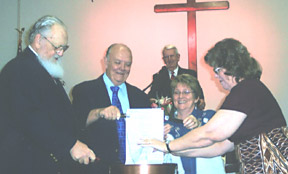 |
| First Church in Fresno recently held a note burning ceremony to commemorate the retirement of the church’s debt on 19 acres of land and its sanctuary. The church was started in 1997. Pictured are original members Dale Wellborn, John Borden, Carol Stoneham and Carol Borden. In the background is Interim Pastor Harold Sellers who helped start the church prior to his retirement as director of missions of Coastal Plains Area. |
• Lon Chaffin, chairman of the department of music and associate professor of music at the University of Mary Hardin-Baylor, recently received the Distinguished Service Alumni Award by Wayland Baptist University’s Association of Former Students.
• Hardin-Simmons Univer-sity named three recipients of its Outstanding Young Alumni Award. Honored were Alex Vasquez, currently associate general counsel of Wal-Mart; Dean Nolen, a writer, actor and soon-to-be producer whose television credits in-clude Law and Order, Crossing Jordan, and Law and Order: Criminal Intent; and Mike Hammack, executive director for Texas Baptist Family Services of Houston.
• Thelma Lou Cooper, retired Baylor University assistant professor of piano, has been inducted into the University of Mary Hardin-Baylor Walter Gilewicz Hall of Fame as its 29th distinguished musician.
• An anonymous gift was presented to Susan Edwards, director of Hope for Healing Ministries at Hendrick Medical Center in Abilene. The gift was a memorial contribution from a Texas Baptist family in the name of Brenda Phillips, who was murdered in a convenience store robbery in Abilene in 1990. The gift will be used to further help establish a Victim Memorial Center in Huntsville. Participating in the ceremony were Jim Young, missions specialist for the Baptist General Convention of Texas; Bruce Lampert, director of pastoral care at Hendrick Medical Center; Bobby Lawson, director of the Hendrick Trauma Center; and Raven Kazen, director of victim services for the Texas Department of Criminal Justice.
• Van Gray, associate vice president for strategic planning and improvement the last four years at Baylor University, is leaving his administrative post, effective May 31, to return to full-time teaching and research in the Hankamer School of Business, where he is professor of management. Gray joined the Baylor faculty in 1986 and received the school’s distinguished professor award in 1994.
Anniversaries
• R.C. Jeanes, 40th, as pastor of Cadiz Church in Beeville, April 1.
• Steve Ewton, 15th, as pastor of Cherry Mound Church in Denison, April 7.
• Tom Henderson, 15th, as pastor of Heights Church in Temple, April 21.
• First Church in Melvin, 100th, April 22-23. A time of fellowship will be held Saturday at 5 p.m. A catered lunch will follow the service on Sunday morning. Make reservations for the meal by calling (325) 286-4342. Bob Gauer is pastor.
• Avoca Church in Avoca, 100th, April 29-30. The celebration will be held from 2 p.m. to 6 p.m. Saturday and from 10 a.m. to 5 p.m. Sunday. A sandwich meal will be furnished on Saturday, and a barbecue and fried chicken meal will be served for lunch Sunday. Programs both days will consist of singing, fellowship, and former pastors and music directors sharing memories. Les Mims is pastor.
• Mike Clements, fifth, as pastor of First Church in Floresville.
• Brett Younger, fifth, as pastor of Broadway Church in Fort Worth.
• Mario Rios, 30th, as pastor of Primera Iglesia in Flour Bluff.
• Harvey Abke, 15th, as pastor of Bamore Road Church in Rosenberg.
• Duane Mayberry, fifth, as pastor of First Church in East Bernard.
Deaths
• Blackie Pack, 71, March 7 in Stephenville. He was a Sunday school teacher and deacon at Riverside Church in Stephenville. He was preceded in death by six sisters and three brothers. He is survived by his wife, Jane; daughters, Charlotte Voth, Tawnya Doggett, Sherri Littlejohn and Kim Sykes; sister, Elsie Gregory; nine grandchildren; and two great-grandchildren.
• Jessie Sain, 72, March 26 in Tulia. Her husband, James, was a pastor in Texas, New Mexico and Colorado. She was a member of Calvary Church in Tulia at the time of her death. She is survived by her husband; daughters, Cindy Rea, Gayla Spencer and Shelia Bice; son, Rickey; brothers, Larry, Jack, Fred, Dickie and Gene Oliver; sisters, Charlene Eastman, Geraldine Witherspoon and Imagean Stripling; and four grandchildren.
• Fern Miles, 91, March 31 in San Angelo. In 1940, she was appointed as a missionary to China by the Foreign Mission Board of the Southern Baptist Convention. After just one year on the field, she was evacuated from because of World War II. She relocated to the Philippines but later was captured there by the Japanese military and held as a prisoner of war. She was freed by American forces in 1945. She returned to China in 1947, only to be forced out a year later by the communist revolution. She turned her efforts to Chinese refugees in the Philippines, starting three churches there. She spent her remaining career teaching at a Baptist seminary in Taiwan and retired in 1975. Single until 1976, she married Carson-Newman College professor Herbert Miles. Together, they wrote four books, including a chronicle of her time as a prisoner of war. Her husband preceded her in death in 1994. She is survived by three brothers and one sister.
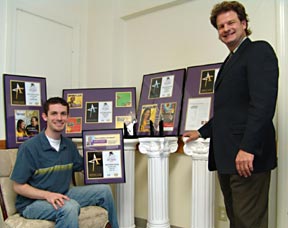 |
| Hardin-Simmons University’s Department of Communications showed it can stand toe-to-toe with any advertising firm in the region as it brought home seven top awards from the 2006 Addy Awards. The only organization that won more awards was a corporate design firm, but every project HSU entered brought home a prize. Pictured are Erin Leeper, interactive graphic designer, and Leland Harden, director of university communications. |
• Rick Holland, 52, April 7 in Orange. He was pastor of Hartburg Church in Hartburg, and former pastor of First Church in Dodge. He was preceded in death by his father, Merrill. He is survived by his wife of 17 years, Donna Sue; daughter, Carissa Holland; mother, Helen; sister, Deborah Lloyd; brothers, Merrill Jr. and Michael.
• Kari Baker, 31, April 8 in Hewitt. Her husband, Matt, is pastor of Crossroads Church in Lorena. She was a graduate of Baylor University and also earned a graduate degree at Dallas Baptist University. She was an elementary school teacher and an adjunct instructor at Tarleton State University. She was preceded in death by her daughter, Kassidy. She is survived by her husband; daughters, Kensi and Grace; parents, Jim and Linda Dulin; brother, Adam Dulin; grandparents, James and Mary Sue Dodson; great-grandmother, Hester Hutchinson; and in-laws, Oscar and Barbara Baker.
Deaths
• The community and county of Liberty proclaimed April 9 “Jerry Johnson Day” in recognition of the pastor who served First Church in Liberty more than 24 years.
• The Singing Women of South Texas will perform at First Church in New Braunfels at 6 p.m. April 22.
Ordained
• Richard Diaz and Marty Summers as deacons at First Church in Cotulla.
Revivals
• First Church of Shady Acres, Brazoria; April 30-May 3; evangelist, Steve Brumbelow; pastor, David Pate.
• Pinecrest Church, Linden; April 30-May 3; evangelist, Gibby McMillian; pastor, Bryan Baggett.
News of religion, faith, missions, Bible study and Christian ministry among Texas Baptist churches, in the BGCT, the Southern Baptist Convention ( SBC ) and around the world.
